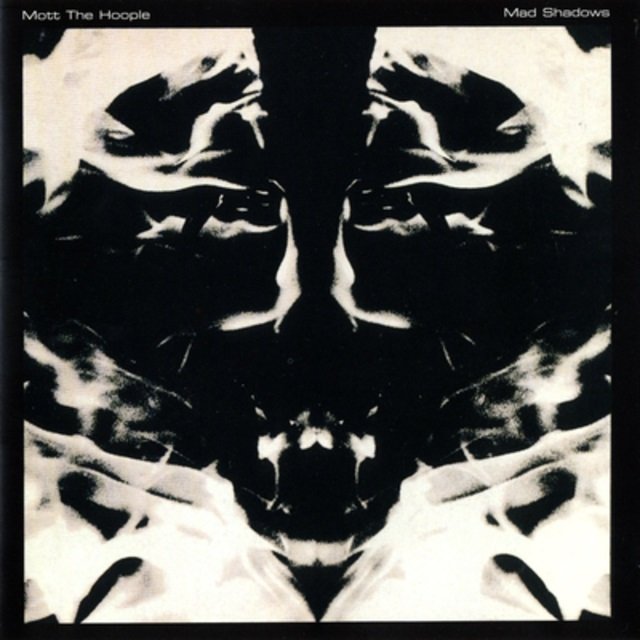MOTT THE HOOPLE - MAD SHADOWS: Bruised Artistry Amid The Chaos
If the first Mott The Hoople album was a magical bit of alchemy that was quickly willed into existence then their second album, Mad Shadows, was the hard-won result of a painful and protracted struggle.A handful of brief sessions were stretched out over six months, constantly interrupted by touring. Ian Hunter was in a bad place emotionally due to the dissolution of his first marriage. To make matters worse, band producer and svengali Guy Stevens was in a most mercurial mode, trying to get Hunter kicked out of the band and toying with one song's mix in a way that made organist Verden Allen break the record after he first heard it. And yet, Mad Shadows somehow salvages a kind of bruised artistry out of all this chaos. Stevens's recording style involved a kind of psychic warfare towards the band, goading them into frenzied performances that were captured without doctoring for bum notes or fluffed tempos, but the band's frequent touring had toughened them up for this kind of ordeal. In fact, tracks often end with "big finish"-style crescendos where they hammer away at a single riff like a train threatening to rocket off the tracks. It's no wonder that a lot of U.K. punks took Mott's catalog to heart.Compositionally, the album is one-third Mick Ralphs to two-thirds Ian Hunter. Ralphs holds down the traditionalist end of things: despite its atmospheric intro,Thunderbuck Ram" is a meat-and-potatoes heavy rocker perfectly at home with the U.K's rock scene circa 1969 and "Threads Of Iron" has a rootsy country-rocker buried inside a jam that gets more frenzied with each minute.That said, it's the Ian Hunter stuff that really fires the engine of this tormented beast. He does the rock as well as Ralphs, offering up some anthemic energy in "You Are One Of Us" and a delightful Stones-ish rocker in "Walkin' With A Mountain," but his heart lies in a string of viscerally emotional ballads that the band transforms into moody rock. "No Wheels To Ride" and "I Can Feel" allow Hunter to pour out his anguish as the band compliments it with suitably intense backing. Ralphs does some excellent guitar soloing in "No Wheels To Ride" and gospel-inflected female backing vocals are smartly deployed in "I Can Feel."Final track "When My Mind's Gone" is perhaps the most legendary with Mott The Hoople fans, a piece that was not only a spontaneous performance but also a spontaneous composition. Legend has it that Stevens sat down in front of Hunter, staring at him and telling him to just start singing over the two chords Hunter had chosen. The results found Hunter taking his broken heart into an almost cosmic realm, raging against the dying of the light in his emotional life with only a skeletal piano and organ backing to add any color. Anyone who's ever felt betrayed by life can relate to the metaphysical distress Hunter summons up here - and the song, like its parent album, is a gem informed by Mott The Hoople's distinctively devil-may-care approach to rock music.
And yet, Mad Shadows somehow salvages a kind of bruised artistry out of all this chaos. Stevens's recording style involved a kind of psychic warfare towards the band, goading them into frenzied performances that were captured without doctoring for bum notes or fluffed tempos, but the band's frequent touring had toughened them up for this kind of ordeal. In fact, tracks often end with "big finish"-style crescendos where they hammer away at a single riff like a train threatening to rocket off the tracks. It's no wonder that a lot of U.K. punks took Mott's catalog to heart.Compositionally, the album is one-third Mick Ralphs to two-thirds Ian Hunter. Ralphs holds down the traditionalist end of things: despite its atmospheric intro,Thunderbuck Ram" is a meat-and-potatoes heavy rocker perfectly at home with the U.K's rock scene circa 1969 and "Threads Of Iron" has a rootsy country-rocker buried inside a jam that gets more frenzied with each minute.That said, it's the Ian Hunter stuff that really fires the engine of this tormented beast. He does the rock as well as Ralphs, offering up some anthemic energy in "You Are One Of Us" and a delightful Stones-ish rocker in "Walkin' With A Mountain," but his heart lies in a string of viscerally emotional ballads that the band transforms into moody rock. "No Wheels To Ride" and "I Can Feel" allow Hunter to pour out his anguish as the band compliments it with suitably intense backing. Ralphs does some excellent guitar soloing in "No Wheels To Ride" and gospel-inflected female backing vocals are smartly deployed in "I Can Feel."Final track "When My Mind's Gone" is perhaps the most legendary with Mott The Hoople fans, a piece that was not only a spontaneous performance but also a spontaneous composition. Legend has it that Stevens sat down in front of Hunter, staring at him and telling him to just start singing over the two chords Hunter had chosen. The results found Hunter taking his broken heart into an almost cosmic realm, raging against the dying of the light in his emotional life with only a skeletal piano and organ backing to add any color. Anyone who's ever felt betrayed by life can relate to the metaphysical distress Hunter summons up here - and the song, like its parent album, is a gem informed by Mott The Hoople's distinctively devil-may-care approach to rock music.


